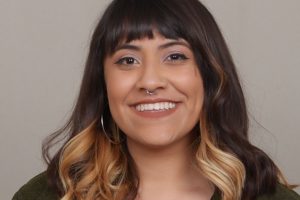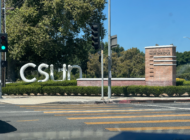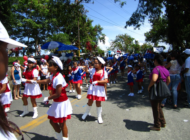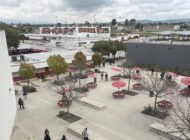In this episode of the series Madre Tierra, Clara Minaya tells us the story of Andrea León Grossman, Climate Action Director at Azul.
By CLARA MINAYA
EL NUEVO SOL—Radio Nepantla
Clara Minaya: Welcome to Radio Nepantla, a podcast from El Nuevo Sol, the multimedia site for the Spanish-language journalism program at California State University at Northridge. My name is Clara Minaya.
The title of this series is Madre Tierra. Our purpose is to highlight individuals who have acommitment to the environment.
Historically, the Latino community has suffered more from the effects of air and water pollution. According to research in recent years, Latinos are more vulnerable to the effects ofclimate change due to the conditions that exist in the places where they live and work.
Who are the people active in environmental issues in their community? In this episode, learn the story of Andrea León Grossman.
Clara Minaya: Andrea León Grossman is the Climate Action Director at Azul, an organization working toward protecting our oceans and all of its resources. She was born in Mexico City and lived there till she moved to the United States in 1983 when she came here for college.
Andrea says she cares a lot about social and environmental justice and recalls one of the first times she saw the effects of what can happen if we don’t take care of our environment while she still lived in Mexico City.
Andrea León Grossman: When I first moved here, in Mexico City, the pollution was so bad that birds were falling from the trees with lead in their lungs, and it really makes you think: “Who’s next?” So, you know, when pollution is so bad that it starts affecting animals at that level, you know that humans are not too far behind. Also, I think it’s worth noting that as you get more engaged in anything that has to do with the environment, you really have to see all those communities that get greatly impacted by corporations, and just, you know, all these extractive economies and how they’re really creating these sacrifice zones. And when you have the tools, and when you learn the tools to organize and create an effective change, I think that is just really powerful. And I think it’s really fulfilling.
Clara Minaya: Andrea says Mexico City doesn’t have a lot of green spaces, but she would go to the beach with her family as an escape from the urban space.
Andrea León Grossman: I also remember going to the beach and just, you know, seeing different beaches, not only in the pacific but also in the Caribbean. Just these pristine beaches and the colors of the beach that were really just astonishing, just mind blowing. Those are the, you know, some of the memories that I have of spending a few days there with my family and playing with my sister. And just, again, just breathing that in and taking the sun. And, again, after living in the city that is one of the biggest in the world, it was just refreshing to be able to kind of escape it all and be in a place like that.
Clara Minaya: She was also a part of a swimming team that would sometimes travel, and it also gave her the opportunity to get out more in nature.
Andrea León Grossman: And I think just traveling, I mean, I remember not only the greenery in terms of the, you know, the colors, and just the, the forests, but also the smell of like, not something that is heavily polluted like the city… in every sense. And the way you perceive everything was just so different and just so profound, that it, you know, it really kind of makes you think like the type of city that you’re growing in. I do like living in cities because of access to… things that you might have. But I think it’s really important to have that access to nature—that brings balance to everyone.
Clara Minaya: When Andrea moved to Los Angeles, she was hoping to have left behind a highly polluted city.
Andrea León Grossman: When I first moved to Los Angeles, I really thought that there was no traffic here or pollution. So that’s, that was… the way I kind of perceived it to be. And I was just there recently, and I really, you know, still have a little bit of a shock when I go there because it’s really not very well planned. And it’s still very—I think there’s a lot of improvement that could go on in terms of policies and more things.
Clara Minaya: A comparison done by Numbeo, the world’s largest database of user-contributed data about cities and countries worldwide, shows that Los Angeles and Mexico City are very similar in terms of pollution. In fact, Mexico City has higher pollution than Los Angeles. Mexico ranks 81.89 on the pollution index while Los Angeles is at 67.56. But they both made Science.orgs list for cities with the worst air quality.
Andrea isn’t new to working in the field of environmental justice. In 2016, she did some work for Food and Water Watch, an organization aimed to make sure everyone has access to food and clean water. This is where she co-wrote two books. One being about fracking—a major issue affecting our water sources.
Fracking is what is used by big corporations to extract oil from underground. This can be done anywhere where there is oil, including our oceans. According to the Center for Biological Diversity, fracking introduces harmful and toxic chemicals to our oceans where it can affect the wildlife and even people. Andrea says that sometimes the process is very harmful in other ways as well.
Andrea León Grossman: The problem is that a lot of that water, by the time it comes out, it’s also radioactive. So it’s really highly toxic water that needs to be disposed of. The process itself could cause earthquakes, but usually disposing of the water is what causes most earthquakes. And you have to have disposal wells to dispose of that water. And that’s another reason we really do not need to be doing this type of extraction or any kind of extraction at this point.
Clara Minaya: An article by Stacker.com says California is the 12th state where fracking is done the most.
After co-writing the book Fracking: ¿Qué es y cómo evitar que acabe con México?, Andrea says she decided to use her expertise to work on other water issues at Azul and to try and help others. She has been working there since late 2018.
Andrea León Grossman: I use some of my expertise in energy and water that I acquired before to work on this campaign and ensure that when I go and visit and organize with communities here in Southern California about desalination and access to the ocean, I can basically communicate with them—whether it’s in English or Spanish—about issues that could affect them down the road.
Clara Minaya: Andrea says there are multiple projects they are working on such as 30 by 30. A project aimed to protect and preserve 30% of our coastline and 30% of our ocean by the year 2030. They are also fighting against desalination plants.
Desalination is the technique used to remove minerals from salt water, a process that could increase production of fossil fuels and lead to more greenhouse gasses in our atmosphere.
Andrea says this is the eleventh year for Azul and that it is growing more and more.
Andrea León Grossman: So, I think right now, we are growing, and we are, I think, beginning to see a lot of change in the way that we are approaching communities. And we’re having an impact not only in the sense that, you know, we go into communities and basically engage with the community to let them know what is the stake in case, like right now in Southern California with the desalination plant, but also in another communities with 30 by 30, and basically enable them to be at the table. There’s a saying that if you’re not sitting at the table, you’re on the menu—and I think we have been on the menu for far too long. So this is a way to ensure that we are now part of the discussion when we know we have to address climate change, sea level rise and other issues. And that we are, again, part of the decision making.
Clara Minaya: Even though the organization is growing, they still make sure to focus on the Latinx community.
Andrea León Grossman: We were founded because we saw this space where the Latino community really does care about the environment and open space and access to nature—especially the ocean and ocean conservation. And we see a lot of these environmental groups, nonprofit groups being very, very white, and not having really a space to really give a voice to the Latino community. So that’s where we come in and make sure that everyone can voice their opinion and ensure that they’re listened to.
Clara Minaya: Andrea says it is important that Latinos also fight to get more access to green spaces and nature as it has been shown that generally Latinx and lower income communities have less access to nature than higher income communities.
Andrea León Grossman: There’s actually a study from UCLA that I think might have come out about two years ago, a little over two years ago. And… low income, communities of color in general have less access. And I think that, that just goes way back to redlining and the way that land use was created. And then environmental racism, the way, I mean, even when we signed the environmental justice law at the Coastal Commission, Robert Garcia, who was alive back then, gave a whole presentation about how we used to have nonstop buses and rail lines from East L.A. to the beach, and racist policies basically cut those nonstop avenues and ways to get to the beach and ensured that there were two or three stops where people had to switch buses, or trains, or trolleys, and things like that. So that, you know, that is something that we need to change. And there’s many things that we need to [engage] to make sure that those types of policies get reverted.
Clara Minaya: Another reason Azul is aiming to provide more equal access to nature is because nature is essential to our overall health.
Andrea León Grossman: Well, I think access to nature is, as the founder says, is not an amenity—it’s a necessity. And we specially saw that with a pandemic. When it hit and everyone had to basically stay at home, we saw people with access to nature [outdoors]—be it the ocean, or be it a river, or, you know, any other kind of open space—that is not just [for] mental health but just overall health, that, you know, they can go and walk and stretch and do other kinds of meditation or recreation. But those who live in… urban centers—with lack of public space and, especially, greenery—their health really took a toll. And, again, we really need to make sure that we have open spaces everywhere and, especially, access to that open space.
Clara Minaya: Azul hopes to contribute to making nature more accessible by opening up California’s last private beach, Hollister Ranch, for everybody, not just Latinos.
Although, she says the Latinx community seems to have more interest in protecting the environment than others.
Andrea León Grossman: I think it’s in our roots. And it’s just a way that we are… I mean, I remember since I was a kid… I was asked to conserve always—like water. And you know: “Don’t dump litter.” And: “Don’t do all these things.” I think it’s just embedded in our culture.
Clara Minaya: Even though the Latinx community is more involved in these issues, Andrea says it is going to take everyone to really do something when it comes to environmental justice.
Andrea León Grossman: Well, they say that if you’re not part of the solution, you’re part of the problem. So, I think it’s going to take all of us to make up the difference that we need. And we need to act fast. And we need to act now to curb the worst effects of climate change. And climate change is going to affect low-income communities of color disproportionately. And I think that we really need to act equitably. And we need to act fast. I mean—it’s here. And it’s not just that it’s just gonna affect low-income communities—it’s gonna affect everyone. So, we really need to do it for everyone.
Clara Minaya: Thanks for listening to Radio Nepantla—La Voz que Traspasa Fronteras. Weinvite you to listen to the rest of the series Madre Tierra. Listen to our podcast on your favorite platform. You can also check our SoundCloud channel—ElNuevoSol—or ourwebsite: ElNuevoSol dot net.
This was a production of El Nuevo Sol—the multimedia project of the Spanish-LanguageJournalism program at Cal State University, Northridge.
This episode was produced and edited by Clara Minaya Voices: Clara Minaya and Andrea León Grossman.
Music by E Jammy Jams.
See you next time!










